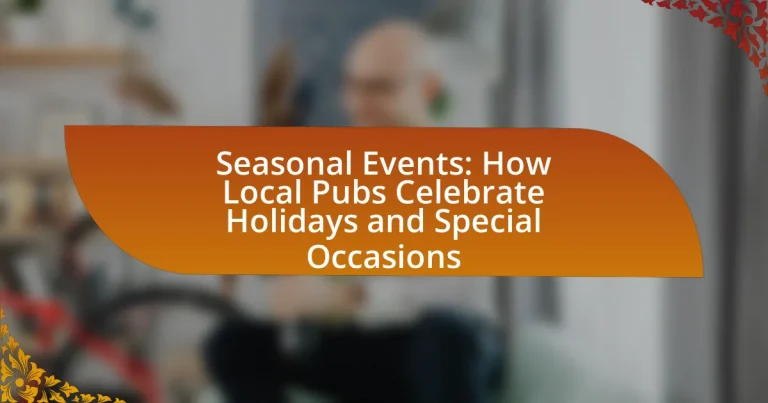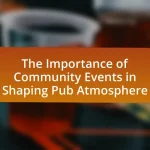Seasonal events in local pubs are themed gatherings that coincide with specific holidays or seasons, aimed at enhancing community engagement and attracting patrons. These events, which include celebrations for Christmas, Halloween, and St. Patrick’s Day, feature special menus, decorations, live music, and themed activities that foster a sense of community and tradition. The article explores how local pubs define and celebrate these events, the economic benefits they provide, and the innovative approaches being adopted to enhance customer experience. Additionally, it discusses the role of technology and social media in promoting these seasonal festivities, as well as best practices for planning and execution.
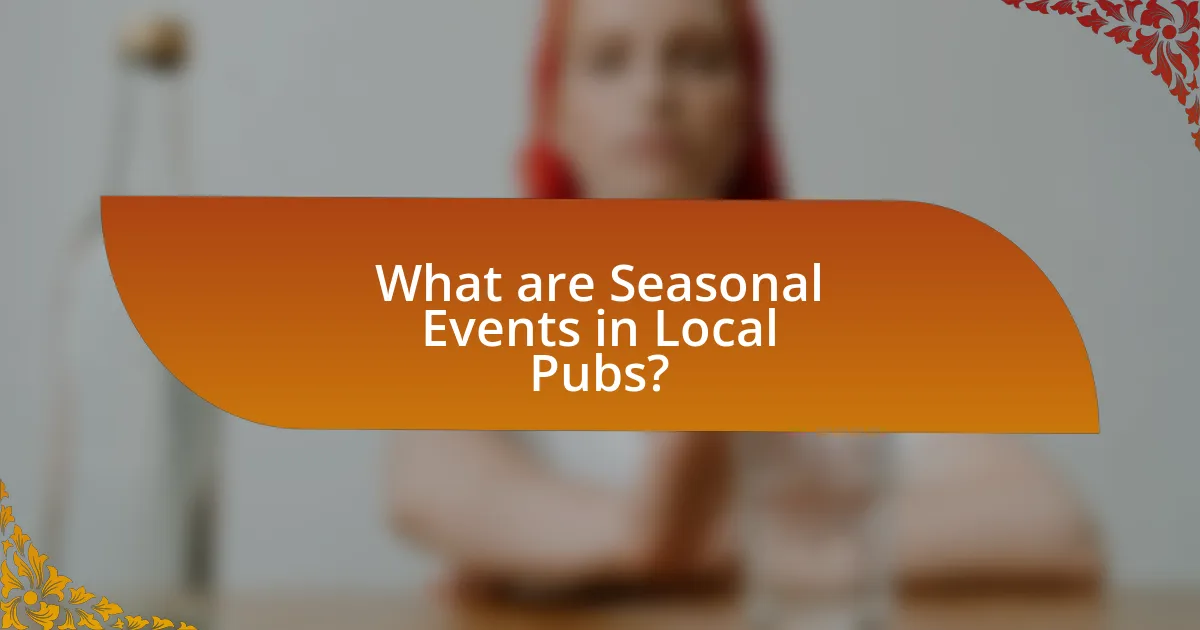
What are Seasonal Events in Local Pubs?
Seasonal events in local pubs are themed gatherings or activities that coincide with specific holidays or seasons, designed to enhance community engagement and attract patrons. These events often include celebrations for Christmas, Halloween, St. Patrick’s Day, and summer festivals, featuring special menus, decorations, live music, and themed activities. For example, during Oktoberfest, many pubs serve traditional German beers and foods, creating an immersive experience that reflects the cultural significance of the event. Such seasonal events not only boost customer attendance but also foster a sense of community and tradition among locals.
How do local pubs define seasonal events?
Local pubs define seasonal events as specific occasions that align with holidays or seasonal changes, often marked by themed decorations, special menus, and unique promotions. These events typically include celebrations like Halloween, Christmas, and summer festivals, which are designed to attract patrons and enhance the communal atmosphere. For instance, many pubs offer seasonal craft beers or host events such as trivia nights or live music that correspond with these occasions, thereby fostering a sense of community and engagement among customers.
What types of holidays and special occasions are celebrated?
Local pubs celebrate a variety of holidays and special occasions, including Christmas, New Year’s Eve, St. Patrick’s Day, Halloween, and Valentine’s Day. These celebrations often feature themed events, special menus, and promotions that attract patrons. For instance, St. Patrick’s Day is widely recognized for its Irish-themed festivities, including live music and traditional food, while Christmas celebrations may include festive decorations and holiday drinks. Such events not only enhance community engagement but also contribute to increased revenue for the pubs during these peak times.
How do seasonal events vary by region?
Seasonal events vary by region due to cultural, climatic, and historical influences. For example, in the United States, Thanksgiving is widely celebrated with family gatherings and feasts, while in Mexico, Día de los Muertos is a significant event honoring deceased loved ones. Additionally, regions with distinct climates, such as tropical areas, may celebrate events like Carnival with outdoor festivities, contrasting with colder regions where winter festivals, such as Christmas markets, are prevalent. These variations reflect local traditions and the environment, shaping how communities engage with seasonal celebrations.
Why are seasonal events important for local pubs?
Seasonal events are important for local pubs because they drive customer engagement and increase revenue. These events create a festive atmosphere that attracts both regular patrons and new customers, leading to higher foot traffic. For instance, during holidays like St. Patrick’s Day or Halloween, pubs often see a significant boost in sales, with some reporting increases of up to 30% compared to regular days. Additionally, seasonal events foster community spirit and loyalty, as locals gather to celebrate traditions, enhancing the pub’s role as a social hub.
How do these events enhance community engagement?
Seasonal events at local pubs enhance community engagement by fostering social interaction and creating a sense of belonging among residents. These gatherings provide opportunities for individuals to connect over shared experiences, such as holiday celebrations or themed parties, which can lead to stronger community ties. Research indicates that community events can increase social cohesion, as evidenced by a study from the Journal of Community Psychology, which found that participation in local events significantly boosts feelings of community attachment and trust among residents.
What economic benefits do seasonal events provide?
Seasonal events provide significant economic benefits by boosting local business revenues and increasing tourism. For instance, during holidays like Christmas or Halloween, local pubs often experience a surge in customer traffic, leading to higher sales of food and beverages. According to a study by the National Restaurant Association, restaurants can see sales increase by up to 30% during holiday seasons. Additionally, seasonal events attract tourists, which stimulates spending in various sectors, including hospitality, retail, and entertainment. This influx of visitors can lead to job creation and increased tax revenues for local governments, further enhancing the economic impact of these events.
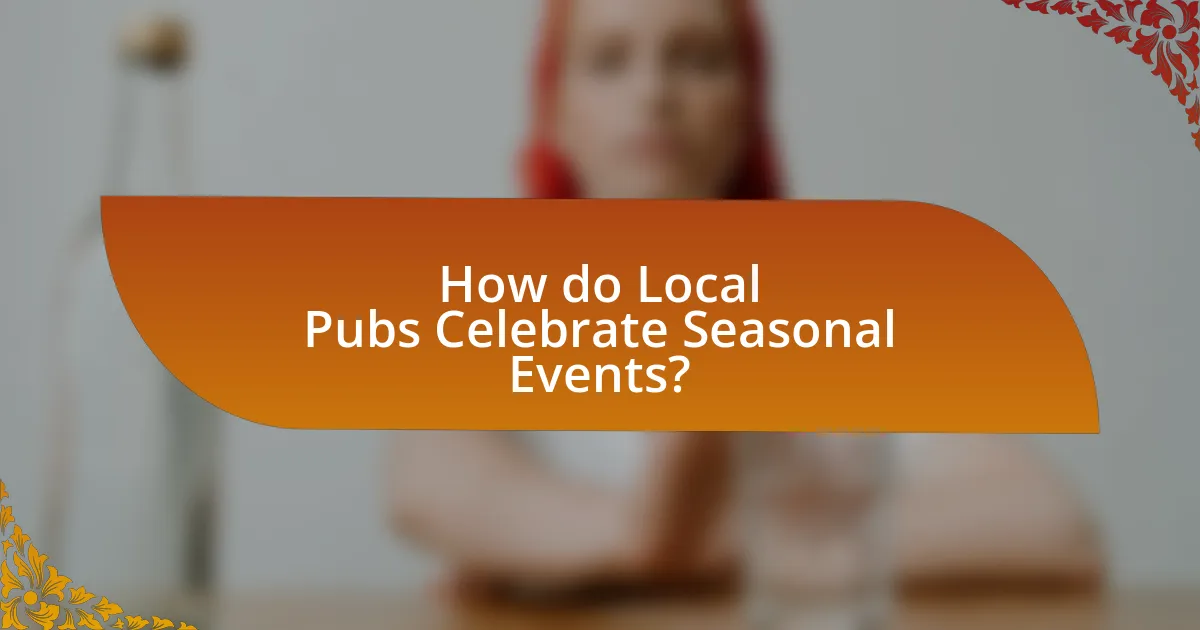
How do Local Pubs Celebrate Seasonal Events?
Local pubs celebrate seasonal events through themed decorations, special menus, and community activities. For instance, during Christmas, pubs often adorn their spaces with festive lights and ornaments, while offering seasonal drinks like mulled wine and eggnog. Additionally, many pubs host events such as Halloween costume parties or St. Patrick’s Day celebrations featuring traditional music and dance. These practices not only enhance the festive atmosphere but also foster community engagement, as evidenced by increased patron attendance during these occasions.
What common themes are found in seasonal celebrations?
Common themes found in seasonal celebrations include community, tradition, and festivity. Community is emphasized as gatherings often bring people together, fostering social connections and shared experiences. Tradition plays a crucial role, as many celebrations are rooted in cultural or historical practices that are passed down through generations. Festivity is evident in the joyful atmosphere created through decorations, music, and food, which enhance the celebratory spirit. These themes are consistently observed across various seasonal events, highlighting their significance in enhancing social cohesion and cultural identity.
How do decorations and ambiance contribute to the celebration?
Decorations and ambiance significantly enhance the celebration by creating an immersive environment that reflects the theme and spirit of the occasion. For instance, festive decorations such as lights, banners, and themed table settings can evoke emotions and set a joyful tone, making attendees feel more engaged and connected to the event. Research indicates that environments rich in visual stimuli can increase feelings of happiness and excitement, which are crucial for successful celebrations. Additionally, the ambiance, shaped by elements like music, lighting, and scent, can influence social interactions and overall enjoyment, reinforcing the communal experience that is central to celebrations in local pubs during holidays and special occasions.
What role does music and entertainment play during these events?
Music and entertainment serve as essential components during seasonal events at local pubs, enhancing the overall atmosphere and engagement of patrons. These elements create a lively environment that encourages social interaction, fosters community spirit, and elevates the celebratory mood. For instance, live music performances or themed entertainment can attract larger crowds, as evidenced by studies showing that venues offering entertainment experience increased patronage and customer satisfaction. Additionally, specific genres of music can evoke emotions and memories associated with the holiday or occasion, further enriching the experience for attendees.
How do local pubs create special menus for seasonal events?
Local pubs create special menus for seasonal events by incorporating seasonal ingredients and themes that resonate with the occasion. They often analyze local produce availability and culinary trends to design dishes that reflect the flavors of the season, such as pumpkin-based items in autumn or fresh seafood in summer. Additionally, many pubs engage with their community to gather feedback on desired menu items, ensuring that the offerings align with customer preferences. This approach not only enhances the dining experience but also fosters a sense of community and celebration around the seasonal event.
What types of food and drink are typically featured?
Local pubs typically feature traditional comfort foods and seasonal beverages during holidays and special occasions. Common food items include hearty dishes like shepherd’s pie, roast dinners, and festive platters, which reflect local culinary traditions. Seasonal drinks often consist of craft beers, mulled wine, and themed cocktails that align with the specific holiday, such as pumpkin ales in autumn or eggnog during winter festivities. These offerings are designed to enhance the celebratory atmosphere and attract patrons looking for a communal dining experience during special events.
How do seasonal ingredients influence menu choices?
Seasonal ingredients significantly influence menu choices by aligning offerings with the availability of fresh produce, which enhances flavor and quality. Restaurants often adjust their menus to incorporate seasonal items, such as pumpkins in autumn or fresh berries in summer, to provide dishes that reflect the time of year. This practice not only appeals to customers seeking seasonal flavors but also supports local agriculture by sourcing ingredients that are in peak condition. For example, a study by the Culinary Institute of America found that menus featuring seasonal ingredients can increase customer satisfaction and drive sales, as diners are more likely to choose dishes that highlight fresh, local produce.
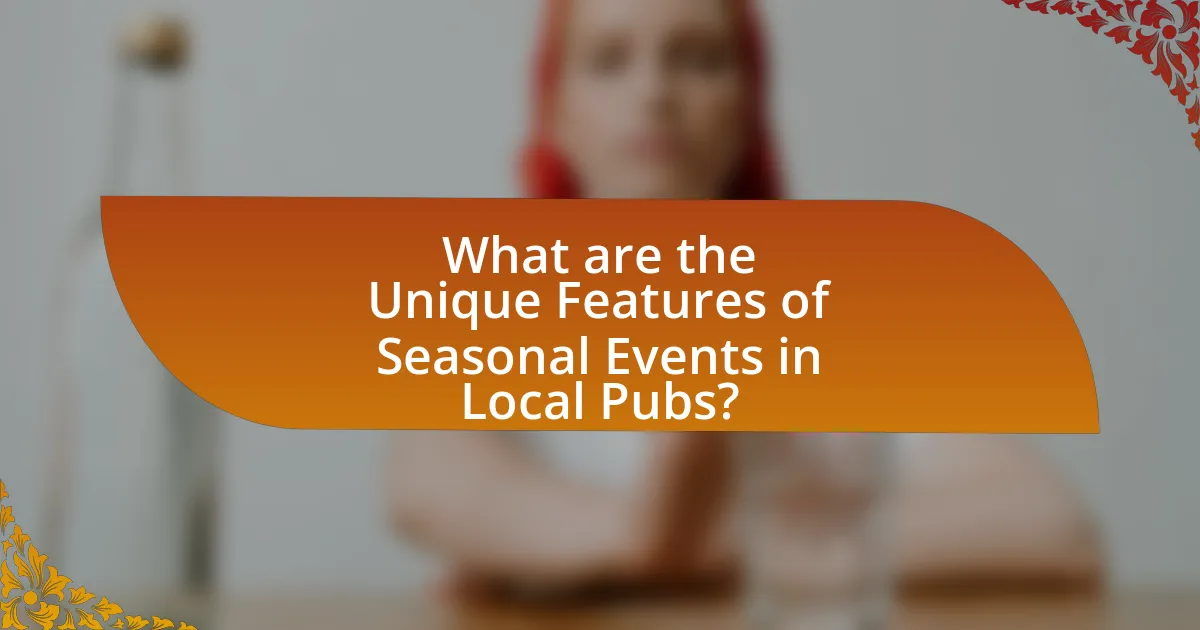
What are the Unique Features of Seasonal Events in Local Pubs?
Seasonal events in local pubs are characterized by themed decorations, special menus, and unique entertainment tailored to specific holidays or occasions. These features create an immersive atmosphere that enhances the celebratory experience for patrons. For example, during Christmas, pubs often showcase festive lights, serve traditional holiday dishes, and host live music or karaoke nights, which attract larger crowds and foster community engagement. Additionally, seasonal events frequently include limited-time drink offerings, such as pumpkin spice ales in autumn or refreshing cocktails in summer, which encourage customers to try new flavors aligned with the season. These unique features not only promote local culture but also drive business during peak times, as evidenced by increased foot traffic and sales reported by many establishments during holiday seasons.
How do local pubs incorporate traditional customs into their celebrations?
Local pubs incorporate traditional customs into their celebrations by hosting events that reflect regional heritage and cultural practices. For example, during St. Patrick’s Day, many pubs feature Irish music, serve traditional dishes like corned beef and cabbage, and offer themed drinks such as Irish stout. Additionally, pubs often decorate their spaces with symbols relevant to the holiday, such as shamrocks for St. Patrick’s Day or pumpkins for Halloween, creating an immersive experience that honors local traditions. This practice not only attracts patrons but also fosters a sense of community and continuity with cultural roots.
What are some examples of unique traditions in different pubs?
Unique traditions in different pubs include the “Pint of Plain” tradition in Ireland, where patrons celebrate St. Patrick’s Day by drinking Guinness, symbolizing national pride. In England, the “Pub Quiz Night” tradition fosters community engagement, with teams competing in trivia for prizes, often held weekly. In Scotland, the “Whisky Tasting” events allow patrons to explore local distilleries, enhancing cultural appreciation. Additionally, some pubs in Germany celebrate Oktoberfest with special beer offerings and traditional food, creating a festive atmosphere. These traditions not only enhance the pub experience but also strengthen community ties and cultural heritage.
How do these traditions enhance the customer experience?
Traditions enhance the customer experience by creating a sense of community and belonging among patrons. Local pubs that celebrate seasonal events, such as holidays and special occasions, foster an inviting atmosphere where customers feel connected to their culture and each other. For example, themed decorations, special menus, and unique events like pub quizzes or live music during these celebrations encourage social interaction and engagement, leading to increased customer satisfaction. Research indicates that 70% of consumers are more likely to return to a venue that offers a unique and memorable experience, highlighting the importance of traditions in driving customer loyalty and repeat visits.
What innovative approaches are local pubs taking for seasonal events?
Local pubs are adopting innovative approaches for seasonal events by incorporating themed menus, interactive experiences, and community engagement activities. For instance, many pubs create special food and drink offerings that reflect the season, such as pumpkin-flavored beers in autumn or festive cocktails during the winter holidays. Additionally, interactive experiences like trivia nights, live music, and themed parties enhance customer engagement and create a festive atmosphere. Community involvement is also emphasized, with pubs hosting charity events or collaborating with local artisans for seasonal markets, thereby fostering a sense of community while attracting more patrons. These strategies not only celebrate the seasons but also drive customer loyalty and increase foot traffic.
How are technology and social media used to promote events?
Technology and social media are utilized to promote events by enabling targeted advertising, real-time engagement, and broad audience reach. Local pubs leverage platforms like Facebook and Instagram to create event pages, share engaging content, and interact with potential attendees, which increases visibility and interest. For instance, a study by Eventbrite found that 93% of event creators use social media to promote their events, highlighting its effectiveness in reaching diverse demographics. Additionally, tools like email marketing and event management software streamline the promotion process, allowing for efficient communication and tracking of attendee responses.
What new trends are emerging in seasonal celebrations?
New trends in seasonal celebrations include a focus on sustainability, community engagement, and digital integration. Local pubs are increasingly adopting eco-friendly practices, such as using locally sourced ingredients and minimizing waste during holiday events. For example, many establishments are hosting community-driven events that encourage local participation and support for nearby businesses. Additionally, the integration of technology, such as virtual reality experiences and online reservations, is becoming more common, allowing pubs to reach a broader audience and enhance customer interaction. These trends reflect a shift towards more responsible and inclusive celebrations in the hospitality industry.
What tips can local pubs implement for successful seasonal events?
Local pubs can implement themed decorations and promotions to create an engaging atmosphere for successful seasonal events. By aligning the decor with the specific holiday or season, such as using pumpkins for Halloween or festive lights for Christmas, pubs can enhance the customer experience. Additionally, offering seasonal menu items, like pumpkin spice beers in the fall or summer cocktails, can attract patrons looking for unique offerings.
Promoting events through social media and local advertising is crucial; studies show that 70% of consumers are influenced by social media when deciding where to go. Hosting live music or entertainment related to the season can also draw crowds, as events with live performances typically see a 30% increase in attendance. Finally, engaging with the community through partnerships with local businesses or charities can foster goodwill and increase foot traffic, as community involvement often leads to a 20% boost in customer loyalty.
How can pubs effectively market their seasonal events?
Pubs can effectively market their seasonal events by utilizing targeted social media campaigns, local partnerships, and engaging promotional materials. Social media platforms like Facebook and Instagram allow pubs to reach specific demographics, promoting events through visually appealing posts and targeted ads. Collaborating with local businesses, such as breweries or food suppliers, can enhance visibility and attract a broader audience. Additionally, creating eye-catching flyers and posters for in-house promotion can capture the attention of patrons, encouraging them to participate in seasonal festivities. According to a study by the National Restaurant Association, 70% of consumers are influenced by social media when deciding where to dine, highlighting the importance of digital marketing in attracting customers to seasonal events.
What best practices should be followed for planning and execution?
Effective planning and execution for seasonal events in local pubs should include clear objectives, thorough market research, and detailed timelines. Establishing clear objectives ensures that the event aligns with the pub’s brand and customer expectations. Conducting market research helps identify customer preferences and trends, which can inform the event’s theme and offerings. Creating detailed timelines allows for organized task delegation and ensures that all preparations are completed on schedule. For instance, a study by the National Restaurant Association indicates that 70% of successful events are planned with a clear timeline and defined goals, highlighting the importance of these best practices in achieving successful outcomes.
